- Home
- Claire Legrand
The Year of Shadows Page 4
The Year of Shadows Read online
Page 4
I frowned. “What does that mean?” Mr. Henry Perfect would probably know.
“It means common. Vulgar.” Joan sniffed. “Anyway, don’t worry about it. Okay? You’re above all that. You’re an artist.”
“Whatever.” I turned back to my drawing. Joan ate her salad in silence.
It was the most I’d said at school all week.
THE NIGHT OF the opening concert of the season, I crept up the west utility staircase like usual. A heavy metal door at the top marked the way to the catwalk, this black metal walkway that stretched from one side of the Hall to the other.
It wasn’t that I liked listening to the orchestra or seeing the Maestro flail his arms around. It’s just that the catwalk was my favorite spot to hide and spy and draw. I could see everything from up there—the different levels of seats, the aisles and exits, the choir loft, the pipe organ loft. The plaster of the ceiling peeling away in curls. The cobwebs stretching across the rafters.
Rails along the sides of the catwalk kept you from falling off. Crisscrossed metal gates blocked off where it wasn’t safe to step.
Igor didn’t mind the metal gates; he slunk around wherever he wanted to, purring the whole time. I bet I could do this with my eyes closed, you know.
“I’m sure you could. Show-off.”
Ghost hunting with Heny is not what I had in mind.
Larry and the other stage technician, Ed, came up a few minutes later. I liked Larry and Ed. They kept to themselves; they never asked a lot of questions. If they knew about where I lived now, they didn’t show it.
“Here to watch the show, eh, Olivia?” Larry said.
“I guess.” I rested my chin on my sketchpad and pressed my face to the railing. Below me, tonight’s audience was starting to trickle in. Most of them wore normal clothes, but some of them, the die-hards, wore furs and gowns, jewelry that blinked at me like stars.
There weren’t very many of them. Part of me wanted to be happy about that; I knew such a small audience would embarrass the Maestro.
The other part of me, deep in my gut, felt afraid and kind of sick. I thought of Nonnie, tiny and frail, legs thin as a bird’s. I’d settled her on a chair by the television monitor in the rehearsal room. The monitor showed everything happening onstage. That’s how she liked watching the concerts.
What if anything ever happened to her? What if she got sick?
I chewed on my lip, staring down at the empty seats. We needed a big audience, not a small one.
We needed the money.
The musicians drifted out onto the stage. After the week of rehearsals they’d had, they didn’t even chat or make jokes with one another. When they started warming up, it seemed like someone had turned down the volume on a giant remote control, like they were afraid to play too loudly. I saw people seated in the dress circle, the die-hards in their furs and coattails, whispering to each other behind their programs.
I’m sure everyone had heard the rumors—about the lack of money, about how there were fewer concerts this year, about Maestro Stellatella living in the back of the Hall and how the orchestra was generally going downhill.
Probably most of them had come tonight just to see if it was true, like when you see a car accident, and you feel bad about looking but you just can’t help it.
When the Maestro walked out and the orchestra stood to acknowledge him, I heard barely any applause from the audience. When the orchestra sat back down, their chairs squeaked, instruments clanging against their music stands.
Scanning quickly, I found Richard Ashley’s sandy brown head in the back row. He looked like anything but a charmer at the moment. His ears were red. He was sweating. I wished I could reach down and hide him from everyone’s stares.
The Maestro raised his hands, and the concert began.
Normally, I would have jammed on my headphones and listened to what Nonnie called my “angry music” while I sketched the night away, but tonight I would be on the lookout for ghosts. The first time I’d seen them had been during the orchestra’s rehearsal. Maybe they’d show up during the concert, too.
Even as I thought the word ghosts, my burn twinged, like it was hungry, like it was ready to jump right off my skin.
First, they played Francesca da Rimini, by Tchaikovsky. That piece is actually all right, as orchestra music goes. It’s about Hell, and ghosts who have to live there and can’t ever leave.
At intermission, I shared peanut butter and jelly sandwiches with Larry and Ed, and then the second half of the concert began. Larry and Ed left me for a bathroom break, and I used this opportunity to pace the catwalk, careful not to ripple the curtains.
I paced until my calves were sore from tiptoeing and my eyes burned from squinting. But there was nothing—no ghosts, no shadows beyond the normal ones.
With a huff, I sat back down on the catwalk, glaring at the Maestro’s shiny black head below me.
I hoped he never figured out I was up here for every concert. He’d think I came for the orchestra, to marvel at his conducting skills. He’d think I was supporting him.
What a joke.
Just as the trumpets started blaring their fanfare onstage, someone tapped me on the shoulder.
I whirled around, barely suppressing a scream.
“Hello,” Henry said, waving.
Igor jumped down from the railing. It appears you’ve been found out.
I impaled a piece of sketch paper with my sharpest charcoal. “You’re not allowed up here, Henry.”
Igor yawned. You’re not allowed up here either, you know.
“I’m allowed anywhere I want.”
Igor batted lazily at a fly. Fair enough. That’s always been my life philosophy.
“Are you talking to your cat?” Henry asked.
“No, stupid, I’m talking to you. What are you doing up here?”
Henry took out a pair of goggles from his pants pocket and put them on. “I came up here to help you. Those ghosts or . . . whatever. I’ve been totally freaked out ever since then. I haven’t been able to study or concentrate at baseball practice. If I don’t figure out what they are, I’ll go nuts. You know?”
I stared at him. Those thick goggles, combined with his usher’s tuxedo, made him look ridiculous.
“You came up here to help me . . . what, exactly?”
“Look for the ghosts. That’s why you’re up here, right?” Henry peered over the railing and then turned quickly back. “Oh wow, we’re high up.”
Igor yawned once again. He’s quick, this one. Quick but with horrible fashion sense.
“Ghosts?” I said. Ghost hunting with Henry is not what I had in mind. “What are you talking about?”
“You know, from last week when we got those burns and we saw those foggy people that looked like ghosts? That.”
“Whatever.” I turned to my sketchpad and pretended to draw. “You were obviously hallucinating.”
“Yeah. Sure. And this burn on my leg is actually a bruise.”
“Why do you have goggles, anyway?”
“For protection.” He tapped one of the thick plastic lenses. “Ghosts are probably pretty unpredictable. And those shadow things . . .” Henry shuddered. “Whatever they are, I’m sure they’re even worse.”
Boiling mad, I shoved my sketchpad in my bag and stalked to the end of the catwalk. I sat down hard on one of the steps, staring at the black grating beneath my boots.
Igor sauntered over. You throw truly marvelous tantrums, did you know that?
“I’m not throwing a tantrum. I just want him to go away and leave me alone.”
Igor slid against my leg. Sounds like a tantrum to me.
“I know what I saw. I know there were ghosts. Or at least, I think that’s what they were. I just . . . Henry’s not my friend.”
Igor began cleaning his paw. And why not? Goggles aside, he seems perfectly decent.
“I don’t want him to see . . .” I struggled to find the words. “Where I live. How I live.”
&
nbsp; Igor coughed up a disdainful hairball. He’s not stupid. He works here. He already knows you live backstage, he knows about your mother, and he hasn’t made fun of you for it. So what’s the problem?
I turned around, glaring at Henry over my shoulder. He sat in the middle of the catwalk, goggles up on his forehead. He waved at me.
“Ugh. Fine.” I tiptoed toward him. Below, the orchestra had started the second movement. “Henry, if I search for ghosts or whatever with you this one time, will you leave me alone?”
Henry stood up, grinning. “You bet.”
“I’m serious. This is it. We’re not friends.”
Henry saluted. “Strictly business.”
“I mean it. This is not your chance to learn all about crazy Olivia so you can go back and laugh about it at school with Mark Everett and his minions. You got that?”
Henry raised an eyebrow. “Minions?”
“You know. Like evil servants.”
“I know what ‘minions’ means. Unlike someone I know, I’ve made the honor roll three years straight.”
I blushed. “Well, good for you, Mr. Smartie Snob. Can we just keep looking?”
“Mark doesn’t have minions, you know. We’ve been friends a long time.”
“Whatever. He has minions. I can tell.”
Henry sighed and put his goggles back on. We searched in silence, the orchestra’s music surrounding us. Every now and then, when they’d play out of tune or out of time, or someone would crack a note, Henry would cringe.
I didn’t let myself cringe. I tried not to think about how Richard and Hilda and Michael and everyone must be feeling, how embarrassed they must be. Instead, I focused on the Maestro. I bet his ears were turning red. I bet he was burning up from the inside out with shame.
Henry and I searched every staircase. We crept through the green room and peeked behind its fraying floral couches. We even snuck into the sound booth, where Fran was recording the concert. She was not happy to see us there, but she let us each have a peppermint anyway. When we reached the rehearsal room backstage, I put myself between Henry and the door and pushed him away.
“All right, search is over. Now you hold up your end of the deal, and go away.”
Henry raised his goggles. “But we haven’t looked backstage yet.”
“And you’re not going to. This is private property.”
“I come into the rehearsal room all the time,” Henry said, frowning.
“Trespasser.” Igor rubbed against my shoe, so I let him jump into my arms. “I could have you arrested.”
Igor looked up at me. That would be a sight to see.
Henry drew himself up angrily, but before he could say anything, the rehearsal room door flew open.
Roger Fernandez, one of the violists, stormed out, jacket flying. “You’re crazy, old man!” he yelled over his shoulder. He didn’t even look at us before slamming open the backstage door and disappearing into the parking lot.
Henry and I stared after him.
“The concert must have ended while we were searching,” Henry whispered.
Oh. This would be good. Musicians yelling at the Maestro and even quitting on him? I couldn’t miss this.
“Come on,” I said, nodding at the door.
We stepped inside the rehearsal room. I immediately wished that we hadn’t.
THE MAESTRO STOOD in the center of the room, staring at the ceiling as the musicians watched in silence.
I found Richard Ashley by his locker. Henry, annoyingly, followed right behind me.
“Richard?” I whispered. “What’s going on?”
Richard put a finger to his lips and shook his head, but he put his other arm around my shoulders.
“I do not know what to say,” said the Maestro finally. “That . . .” He laughed, but it wasn’t a nice laugh. “My friends, that was not good.”
I glanced up at Richard for his reaction. It was the first time I noticed how tired he looked, how many lines crisscrossed his face, how faded his tuxedo had become.
Then, out of nowhere, the Maestro grabbed the nearest folding chair and threw it against the wall.
Everyone jumped. Richard pushed me and Henry behind him, his hand tight on my shoulder. Igor growled softly.
The chair flew into an old set of wind chimes and sent them crashing to the floor. The racket lasted for centuries. The Maestro turned his back to everyone, put his hands on the wall, and leaned his head against it.
I tried to clamp down on the panicked somersaults in my stomach, but it didn’t work so well. Poor Igor must have been squeezed within an inch of his life.
Finally, the Maestro picked up the walkie-talkie at his belt. “Jeremy, if you’ll come backstage, please.”
“Be there shortly, sir,” came Jeremy’s static-lined reply.
For a brief, awful, wonderful second, I closed my eyes and imagined that Richard Ashley’s arm on my shoulders was Mom’s arm instead.
When the Maestro started having fits like this, right before The Economy changed, right before everything changed, Mom would make me a bedsheet fort and cut out stars from the scrap paper she brought home from the office. Once the fort was done, and the stars strung up, she and I would lie under the starry bedsheet sky. She would hug me and kiss my hair and tell me a story. I’d fall asleep to her fingers tracing shapes on my back, the Maestro’s music floating up from downstairs.
“I was not going to tell you this,” the Maestro said, staring down each of the musicians, one by one. “I was going to wait until later in the season. I thought, Why upset them? There was no need. But then you play like a high school group. Need I remind you, you’re getting paid for this? You are professionals.”
Jeremy, the box-office clerk, entered the room. He held a scrap of paper in his hands.
“I’m here, sir.”
The Maestro waved his hand impatiently. “Tell them how many people were in the audience tonight. Tell them.”
Jeremy paused. Mr. Rue, the president of the orchestra, came up behind him, hidden in the hallway that led to the east side of the stage. He crossed his arms over his chest, watching. Mr. Rue basically ran the orchestra; he decided where the money went, and hired and fired people, and was the Maestro’s boss. They were old friends. Mr. Rue usually stayed out late after concerts, doing what Mom always called “The Big Schmooze.” That meant sucking up to the rich people so they’d give the orchestra money.
Seeing Mr. Rue standing there spooked me. Why wasn’t he out schmoozing? This was bad.
The Maestro pounded his fist against the wall. “Tell them, Jeremy.”
“Okay, I’m—I’ve got it right here.” Jeremy fumbled with the paper. “We had four hundred twenty-three people in attendance tonight.”
“What was that, Jeremy?”
“Four hundred twenty-three.”
Beside me, Henry slumped against a stack of chairs. Richard Ashley sat down heavily on the bench in front of us. I didn’t want to be there anymore.
“And the total box-office receipts?” The Maestro paused. “How much money, Jeremy?”
“$21,008.”
That might seem like a lot of money. But when you have to pay over a hundred musicians and office staff, and keep the electricity on and keep the Hall itself from falling down, it isn’t a lot of money at all.
A couple of the musicians said a bad word or two. One of the clarinet players started to cry.
Mr. Rue stepped out of the shadows, his bald head gleaming. Even his tuxedo looked rumpled. “What’s the problem, ladies and gentlemen? What happened tonight?”
No one had anything to say.
“I know it’s hard. What with the current state of the economy, you’ve already taken pay cuts. And with the Hall in its current condition . . .” Mr. Rue waved one hand at the ceiling. “I know I wouldn’t want to perform under these circumstances. But if ticket sales don’t go up—drastically— by the end of the season . . . I don’t know what will happen. We may have to shut down. Pull the plu
g.”
The Maestro stalked out. The sound of his slamming bedroom door echoed through my bones. Nobody moved for a long time.
Mr. Rue rubbed his forehead, his eyebrows creasing sadly. “I’m sorry to be the bearer of bad tidings, everyone. I wish I didn’t have to be.”
Richard Ashley squeezed my shoulder. I looked at him and felt instantly better. Richard always knew just what to do and say, in any situation. It was part of his charm. That’s what Mom always said, right before rolling her eyes.
“Richard?” I said. “He’s not serious, is he?”
“Yeah, Olivia,” he said, turning away, like he couldn’t stand looking at me anymore. “I think he is, kiddo.”
As everyone drifted out into the parking lot, Mr. Rue found me and patted my arm. “It will be all right, Olivia, somehow. Trust me. Trust your father. Hmm?”
My throat was so pinched I couldn’t get out what I wanted to say:
Why should I trust the Maestro? He’d torn our family apart.
Right before Henry left with Richard for his ride home, he pressed a folded-up note into my hand. It said only: This isn’t over. Not to sound creepy. I just mean, I know we didn’t find the ghosts tonight. But we will. See you at school.
I folded up his note and slipped it under my pillow. For a long time, I stared at the ceiling, thinking. Igor snuggled up next to me. Across the room, Nonnie breathed thin, rattling breaths. I snuck over and tucked my quilt around her so she’d be warmer. Those strange cold gusts were happening more and more now, ever since Henry and I had seen the ghosts. I didn’t know what that meant, but it couldn’t have been good.
By the time I settled back in bed, I’d made my decision: I would do it. I would find the ghosts, even if that meant teaming up with Perfect Henry Page. Two heads were better than one, after all, and I needed to find these ghosts. I had to. Maybe I couldn’t fix everything in my life—maybe the orchestra was awful and we were poorer every day and Mom was gone and school was the pits, but this—I could do this. I could find the ghosts.
If I could make sense of ghosts, if I could solve that, I could solve anything.

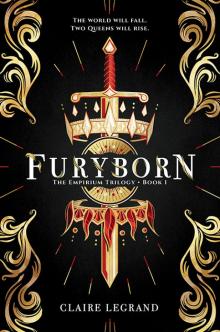 Furyborn
Furyborn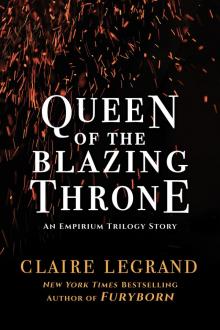 Queen of the Blazing Throne
Queen of the Blazing Throne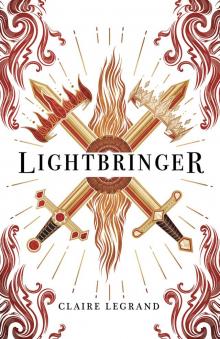 Lightbringer
Lightbringer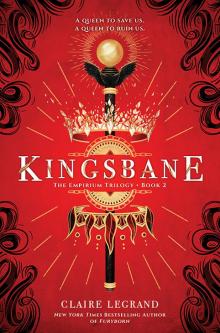 Kingsbane
Kingsbane Cavendish Home for Boys and Girls
Cavendish Home for Boys and Girls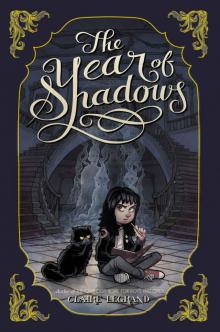 The Year of Shadows
The Year of Shadows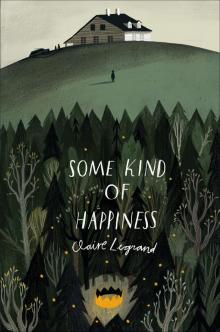 Some Kind of Happiness
Some Kind of Happiness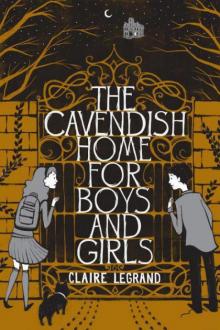 The Cavendish Home for Boys and Girls
The Cavendish Home for Boys and Girls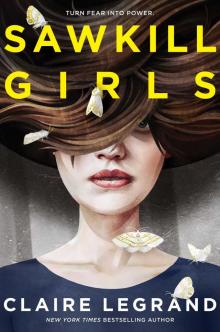 Sawkill Girls
Sawkill Girls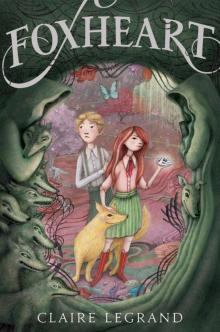 Foxheart
Foxheart Summerfall: A Winterspell Novella
Summerfall: A Winterspell Novella